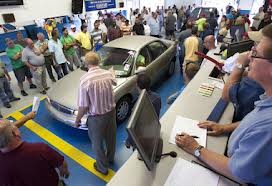Foreclosed homes are always sold in an “as is” condition. Before you make an offer, you should visit the home at least a couple times. If you can go there on a rainy day, that would be best to see if there are any leaks. Also, return on the weekend or in the evening so you can see what the neighborhood is like and meet the neighbors. Neighbors are a source of information. They will tell you a lot about the former owner and any problems they are aware of with the house as well. If the home is a bank owned REO and listed with a Realtor, the Realtor must disclose any material facts that they are aware of that may affect your decision to buy the home, but you should never rely on these facts only. Banks are not required by law to deliver a seller’s transfer disclosure statement on any foreclosure homes they are offering for sale so you are on your own. It is up to the buyer to investigate the condition of the home by having a home inspection.
A professional home inspector performs the home inspection services. Some states require home inspectors to be certified with special training. You could also hire an engineer or contractor to perform the home inspections. The condition of the home affects the value so if the foreclosure home needs major systems repaired or replaced or has structural damage, the value is going to be substantially less. It is also important to investigate homes that have recently sold which are comparable so you know whether or not you are paying the right price for the foreclosed home. You should not assume that every foreclosure property is a good deal without doing your due diligence first.
Since most foreclosure homes have not been maintained very well by their former owners and the banks don’t spend much on maintenance once they acquire the home, the majority of foreclosure properties are in poor condition. An inspection will reveal whether the home is in violation of local or state building and safety codes too. Properties that were built prior to code changes are said to be grandfathered in. However, if you are going to rehab the home and tear down or add on to it, you may need to bring the home up to code first. This can get quite expensive. Also, structural damage is very expensive to fix.
Your home inspector will concentrate on the home’s systems to make sure they are in good working order including plumbing, roof, electrical, heating and air conditioning and appliances. In particular, the inspector will alert you to mold or ventilation problems. Mold flourishes in damp and humid environments. Certain molds are more harmful. Black mold is a sign the home has a serious mold problem. Other areas of concern are crime and vandalism. Common items that may be taken are air conditioning and heating systems, water heaters, copper plumbing, pool equipment, appliances. Former owners are also guilty of stripping their homes of appliances, hardware, ceiling fans, doors, cabinets, toilets and punching holes in walls.
Abandoned homes with yards that are not maintained in places like Florida attract snakes. Bees are also common vacant home invaders inside and outside of the home. Wild animals can also get inside if there are doors or windows left open or broken or cracked windows. Insects can invade an abandoned home. You will want to have the home fumigated after you purchase it.
Besides hiring a home inspector, you can walk around the property and pay attention to the following items:
- Grading
- Roof
- Broken windows
- Paint
- Window screens
- Law
- Driveway
- Deck
- Porch
The bank is under no obligation to repair any items. Homes sold at foreclosure auctions are sold with no guarantees or warranties. The advantage of purchasing a REO over a home at a foreclosure auction is you may be able to negotiate with the bank for a credit or for them to fix a mold or other health or safety problem, but they do not have to by law unless they agreed to it in the purchase contract. Still it does not hurt to ask. The worst that can happen is they say no. Knowing the condition of the home will then help you decide if you want to go forward and purchase it or pass and look for a home in a better condition. Keep in mind that if the home is really a good bargain even with the repairs that are needed, and you can do some of them yourself, you may want to go ahead with the purchase.











